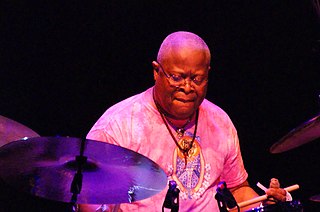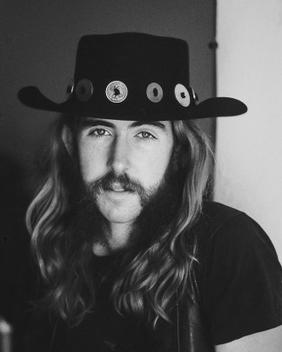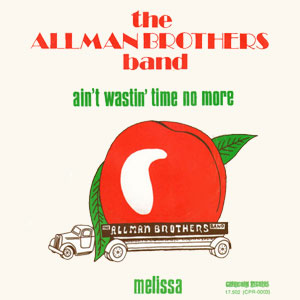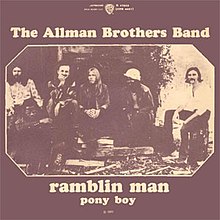
The Allman Brothers Band was an American rock band formed in Jacksonville, Florida, in 1969 by brothers Duane Allman and Gregg Allman, as well as Dickey Betts, Berry Oakley (bass), Butch Trucks (drums), and Jai Johanny "Jaimoe" Johanson (drums). Subsequently, based in Macon, Georgia, they incorporated elements of blues, jazz and country music and their live shows featured jam band-style improvisation and instrumentals.

Eat a Peach is a 1972 double album by American rock band the Allman Brothers Band, containing a mix of live and studio recordings. Following their artistic and commercial breakthrough with the July 1971 release of the live album At Fillmore East, the Allman Brothers Band got to work on their third studio album. Drug use among the band became an increasing problem, and at least one member underwent rehab for heroin addiction. On October 29, 1971, lead and slide guitarist Duane Allman, group leader and founder, was killed in a motorcycle accident in the band's adopted hometown of Macon, Georgia, making it the final album to feature him.

Gregory LeNoir Allman was an American musician, singer and songwriter. He was known for performing in the Allman Brothers Band. Allman grew up with an interest in rhythm and blues music, and the Allman Brothers Band fused it with rock music, jazz, and country at times. He wrote several of the band's most popular songs, including "Whipping Post", "Melissa", and "Midnight Rider". Allman also had a successful solo career, releasing seven studio albums. He was born and spent much of his childhood in Nashville, Tennessee, before relocating to Daytona Beach, Florida and then Macon, Georgia.

Forrest Richard Betts was an American guitarist, singer, songwriter and composer best known as a founding member of the Allman Brothers Band.

John Lee Johnson, frequently known by the stage names Jai Johanny Johanson and Jaimoe, is an American drummer and percussionist. He is best known as one of the founding members of the Allman Brothers Band and, with the death of Dickey Betts, is the last surviving original member of the band.

Raymond Berry Oakley III was an American bassist and one of the founding members of the Allman Brothers Band. Known for his long, melodic bass runs, he was ranked number 46 on Bass Player magazine's list of "The 100 Greatest Bass Players of All Time". He was posthumously inducted into the Rock and Roll Hall of Fame as a member of the Allman Brothers Band in 1995.

The Allman Brothers Band is the debut studio album by American rock band the Allman Brothers Band. It was released in the United States by Atco Records' subsidiary Capricorn on November 4, 1969, and produced by Adrian Barber. Formed in 1969, the Allman Brothers Band came together following various musical pursuits by each individual member. Guitarist and bandleader Duane Allman moved to Jacksonville, Florida where he led large jam sessions with his new band, one he had envisioned as having two guitarists and two drummers. After rounding out the lineup with the addition of his brother, Gregg Allman, the band moved to Macon, Georgia, where they were to be one of the premiere acts on Capricorn.

Idlewild South is the second studio album by American southern rock band the Allman Brothers Band. Produced by Tom Dowd, the album was released on September 23, 1970 in the United States by Atco Records and Capricorn Records. Following the release of their 1969 debut, the Allman Brothers Band toured the United States extensively to promote the album, which had little commercial success. Their performances, however, did create positive word of mouth exposure that extended to more famous musicians, such as Eric Clapton, who invited group leader Duane Allman to contribute to his 1970 album Layla and Other Assorted Love Songs.

Brothers and Sisters is the fourth studio album by American rock band The Allman Brothers Band. Co-produced by Johnny Sandlin and the band, the album was released in August 1973 in the United States by Capricorn Records. Following the death of group leader Duane Allman in 1971, the Allman Brothers Band released Eat a Peach (1972), a hybrid studio/live album that became their biggest-selling album to date. Afterwards, the group purchased a farm in Juliette, Georgia, to become a "group hangout". However, bassist Berry Oakley was visibly suffering from the death of Duane, excessively drinking and consuming drugs. In November 1972, after nearly a year of severe depression, Oakley was killed in a motorcycle accident, making it the last album on which he played.

Wipe the Windows, Check the Oil, Dollar Gas is a 1976 double live album by the Allman Brothers Band.

"Jessica" is an instrumental piece by American rock band the Allman Brothers Band, released in December 1973 as the second single from the group's fourth studio album, Brothers and Sisters (1973). Written by guitarist Dickey Betts, the song is a tribute to gypsy jazz guitarist Django Reinhardt, in that it was designed to be played using only two fingers on the left hand.

The Road Goes On Forever was The Allman Brothers Band's first compilation album, a two-LP set released in 1975. It featured songs from the Allmans' first five albums. In 2001, an expanded edition was released featuring 13 more tracks. The album's title is a line from "Midnight Rider."

The Allman Brothers Band was an American rock band formed in Jacksonville, Florida, in 1969 by brothers Duane Allman and Gregg Allman, as well as Dickey Betts, Berry Oakley, Butch Trucks (drums), and Jai Johanny "Jaimoe" Johanson (drums). The band incorporated elements of Southern rock, blues, jazz, and country music, and their live shows featured jam band-style improvisation and instrumentals.

Gold is a two-CD compilation album by the Allman Brothers Band. It contains songs selected from their first eight albums, which were released by Capricorn Records — The Allman Brothers Band (1969), Idlewild South (1970), At Fillmore East (1971), Eat a Peach (1972), Brothers and Sisters (1973), Win, Lose or Draw (1975), Wipe the Windows, Check the Oil, Dollar Gas (1976), and Enlightened Rogues (1979). It was released by Island Records on October 11, 2005. It is a reissue of the 2001 expanded compilation The Road Goes On Forever: A Collection of Their Greatest Recordings.
"Whipping Post" is a song by The Allman Brothers Band. Written by Gregg Allman, the five-minute studio version first appeared on their 1969 debut album The Allman Brothers Band. The song was regularly played live and was the basis for much longer and more intense performances. This was captured in the Allman Brothers' 1971 double live album At Fillmore East, where a 22-minute, 40-second rendition of the song takes up the entire final side. It was this recording that garnered "Whipping Post" spots on both the Rock and Roll Hall of Fame's 500 Songs that Shaped Rock and Roll list and Rolling Stone's list of "The 500 Greatest Songs of All Time", which wrote, "the song is best appreciated in the twenty-three-minute incarnation on At Fillmore East."
"Blue Sky" is a song by the American rock band The Allman Brothers Band from their third studio album, Eat a Peach (1972), released on Capricorn Records. The song was written and sung by guitarist Dickey Betts, who penned it about his girlfriend, Sandy "Bluesky" Wabegijig. The track is also notable as one of guitarist Duane Allman's final recorded performances with the group. The band's two guitarists, Duane Allman and Dickey Betts, alternate playing the song's lead: Allman's solo beginning 1:07 in, Betts joining in a shared melody line at 2:28, followed by Betts's solo at 2:37. The song is notably more country-inspired than many songs in the band's catalogue.

The Allman Brothers Band Museum, also known as The Big House, is a museum in Macon, Georgia, United States. It was the home to The Allman Brothers Band's original members, their families, and various friends from 1970 to 1973. The Big House was renovated by The Big House Foundation and opened in November 2009 as an interactive museum dedicated to identifying and preserving the history of The Allman Brothers Band.

"Ain't Wastin' Time No More" is a song by the American rock band the Allman Brothers Band. It was the lead single from their third studio album, Eat a Peach (1972), released on Capricorn Records. The song, written by Gregg Allman, largely concerns the death of his brother, Duane Allman, who was killed in a motorcycle crash in 1971.

Duane Betts is an American guitarist and singer-songwriter. He leads Duane Betts & Palmetto Motel, and is a co-founding member of The Allman Betts Band. He was also a guitarist and singer for Dickey Betts & Great Southern, led by his father, Dickey Betts. He was previously a member of several other groups, including Backbone69, Whitestarr, Brethren of the Coast, Dawes, Jamtown, and Duane Betts & the Pistoleers.

















